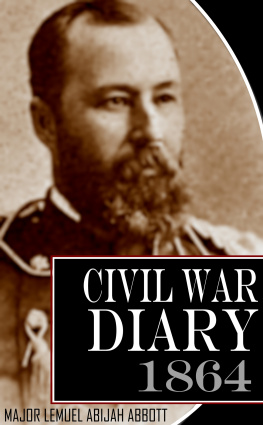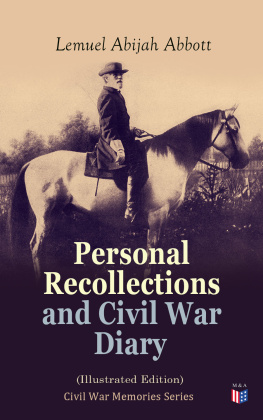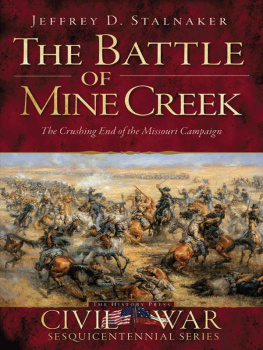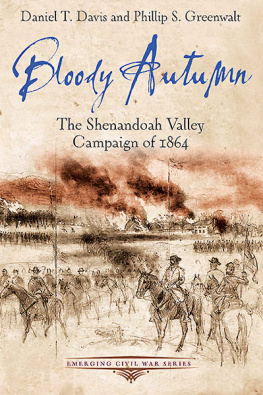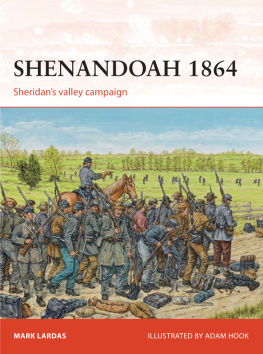
CIVIL WAR DIARY
1864
By
MAJOR LEMUEL ABIJAH ABBOTT, U. S. A.
Late Captain 10th Regt. Vt. Vol. Infantry
1908.
COPYRIGHT 2014 BIG BYTE BOOKS
Get more great reading from BIG BYTE BOOKS
PUBLISHERS NOTES
We are very fortunate that so many of the diarists who fought on the front lines of important battles of the American Civil War were articulate, often very good writers. Lem Abbott was one of those.
Lemuel Abijah Abbott was born on August 24, 1842 in Barre, Vermont to Richard Flagg Abbott, a stonecutter, and his wife Mary Norris. Lem was the youngest of four children. By the age of 18, Lem and his older brother had taken up their fathers craft. He has a listing for the class of 1864 in the Norwich University student roster, stating that he earned a bachelor of science degree and was a Phi Theta fraternity member.
He enlisted in Company B, Vermont 10th Infantry Regiment on September 01, 1862. Promoted to 2nd Lieutenant on January 26, 1863, he was then promoted to 1st Lieutenant on June 17, 1864, Captain on December 19, 1864, and mustered out on June 22, 1865. He then enlisted in the U.S. Colored Troops 97th Infantry Regiment on 06 Nov 1865; mustered out on April 06, 1866.
Abbott was wounded four times in the Civil War and fought in a score of battles.
After the war, Lemuel joined the Sixth Cavalry. In 1879 he was posted to command Camp Thomas in the wilds of Pima, Arizona. While there, upon his recommendation, attempts were begun to school children in the neighboring Indian tribes.
Abbott retired from the army in 1883 and was brevetted a major. He never married.
During the 1900 federal census, Abbott was living in Williamstown, Vermont and listed his occupation boldly as Capitalist. How successful he was as a capitalist remains to judged, as he was living as a boarder in someone elses home. He died in Aberdeen, Washington (later famous as the home of Curt Cobain of Nirvana) on February 03, 1911. He is buried beneath a rather impressive obelisk in his home town of Barre, Vermont.
DEDICATION
TO THE PATRIOTS AND COMRADES OF ONE OF VERMONTS MOST GALLANT REGIMENTS, THE TENTH VERMONT VOLUNTEER INFANTRY. MAY ITS STATE PRIDE, FIDELITY, ESPRIT DE CORPS AND SPLENDID RECORD IN THE CIVIL WAR SERVE AS AN EXAMPLE AND INSPIRATION TO COMING GENERATIONS.
PREFACE
THE following Diary covering the interesting period of the Civil War from January 1, to December 31, 1864, and a portion of 1865 to the surrender of General R. E. Lee at Appomattox Court House, Va., was kept by the Author at the age of twenty-two when an officer of the Tenth Regiment Vermont Volunteer Infantry, Third and First Brigade, Third Division, Third and Sixth Corps respectively, Army of the Potomac, and is a brief war history as seen by a young soldier literally from the front line of battle during General U. S. Grants celebrated campaign from the Rapidan River to Petersburg, Va., [the Overland Campaign] and Gen. P. H. Sheridans famous Shenandoah Valley campaign in the summer and fall of 1864. During this time the Author passed from the grades of Second to First Lieutenant and Captain, and commanded in the meantime in different battles five or more companies in his regiment which afforded an excellent opportunity to make a fairly interesting general diary of the fighting qualities of his regiment and especially of the companies which he commanded during that most interesting period of the Civil War when the backbone of the Rebellion was broken, which, together with Sherman and Thomas cooperations led to the surrender of General R. E. Lee at Appomattox C. H. April 9, 1865.
For thirty-eight years the diary remained closed, and indeed had been forgotten by the Author until he accidentally ran across it one day in an old chest, when on leave of absence in Vermont, where it had been placed after the war by someone for safe keeping, the Author in the meantime having been an officer in the regular army many years and honored with the degree of B. S by his Alma Mater on account of his supposed accomplishments in military science after many years of hard service, a large portion of which was on the frontier among the Indians whose civilization was finally largely brought about through his recommendation to educate all the Indian children throughout the United States, about 1877-9 when he was considered an expert on the Indian question both by the War and Interior Departments.
On reviewing the diary with the eye of an expert, it was found so uniquely interesting on account of the many dramatic situations simply given in a youths unpretentious way that, from the fact it contained so much of interest to the surviving men whom the Author was honored in and fortunate enough to command during such a historic period, and especially to the kinsmen of those who have passed along to the higher life, he concluded to publish it in full.
It is not pretended that it is based on any official general orders but is solid fact and experience simply told by a young soldier who stood up to the rack in the front line of battle and took uncomplainingly whatever was in store f or him, steadily refusing to accept whatever was offered which would remove him from the line of battle to a safer place at home or in the rear because he not only preferred to occupy a place in the front line of battle in command of men, which he considered the most honorable place for a soldier in the army at such a time, but because he had grown sincerely attached to the brave men in the different companies and detachments he commanded which comprised the whole regiment and some in others who not infrequently by reason of superior physical endurance and courage led and inspired him in some of the most noted battles of ancient or modern times.
A diary was kept during a portion of 1865 to the close of the war, but its whereabouts if preserved are unknown to the Author; so that in 1865, only a few of the most strikingly dramatic scenes and battles are given in the addenda as the curtain was falling on the greatest civil conflict of modern times, one of the most impressive of which was General Grants magnificent bearing as he rode at a goodly pace, silently with his retinue, along among his men inside the enemys works after they had been captured by the celebrated fighting Sixth Army Corps which he had specially selected, as it was said at the time, to break the enemys line at the point where it was broken in front of Petersburg, on the morning of the memorable Second of April, 1865. This and other startling and unexpected scenes crowded each other so closely the following week they are indelibly photographed on the mind of the writer never probably to be forgotten so long as time shall last; and they are not overdrawn as no pen is sufficiently graphic to anywhere near do the subject justice.
Had there been an artist on the ground to have seen Grant as he then appeared, the very ideal of a silent, unassuming yet stern-looking, determined and dignified conquering hero, who could have reproduced the scene on canvas, his fame would have been established, for the writer never saw him to better advantage nor could anyone else, as the occasion and surroundings were all there, never to be again exactly repeated in any gigantic struggle, i.e. the great battlefield studded with unusually extensive, silent, deserted and partially dismantled, formidable earthworks and military camps, shattered, abandoned and captured ordnance, the defeated, struggling and straggling enemy, the prisoners of war, the wounded, dead and dying, the shocking sight of carnage, and last, but not least, the victorious army headed by its intrepid but humane big-hearted leaderGrant. It would be a historic picture before which the civilized world would pause entranced; it was grandly impressive beyond description. As an entrancing, dramatic incident, the surrender of Lee, a few days later at Appomattox Court House, sinks into insignificance.
Next page
